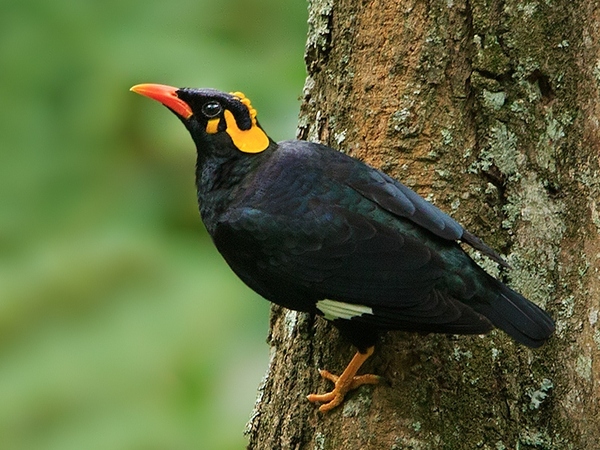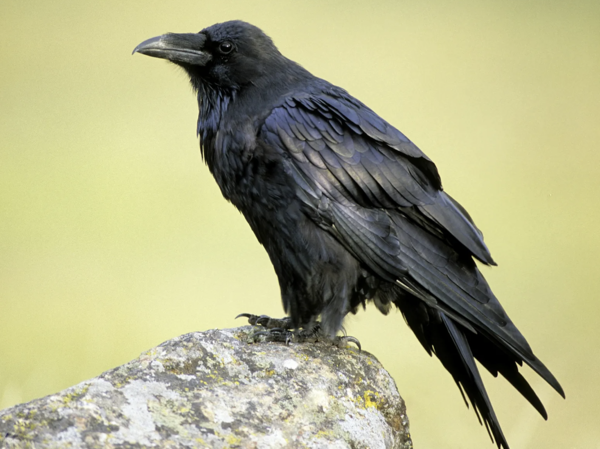Mynah birds and crows are often mistaken for each other due to their similar black feathers and ability to mimic sounds. However, they belong to entirely different families and exhibit distinct characteristics in terms of behavior, intelligence, habitat, and appearance. In this article, we will thoroughly explore the differences between mynah birds and crows, addressing the key aspects that set them apart.
The first major difference between mynah birds and crows is their classification in the bird family tree. These two birds belong to separate families, which influences their behavior, diet, and physical traits.

Mynah birds, specifically the common mynah (Acridotheres tristis), belong to the Sturnidae family. This family is also known as the starling family, which includes other songbirds known for their vocal abilities.
Family: Sturnidae
Genus: Acridotheres
Species: Acridotheres tristis (Common Mynah)

Crows, on the other hand, belong to the Corvidae family, which includes a variety of intelligent and adaptable birds like ravens, jays, and magpies. Crows are known for their advanced problem-solving abilities and complex social structures.
Family: Corvidae
Genus: Corvus
Species: Corvus corax (Common Raven), Corvus brachyrhynchos (American Crow)
While mynah birds and crows may both be dark in color, their physical characteristics are quite distinct.
Size: Mynah birds are medium-sized birds, measuring around 9-13 inches in length.
Color: Mynah birds typically have a brown or black body with bright yellow patches on their wings, tail, and around their eyes. Some species have a more vibrant yellow coloration or a white stripe on their wings.
Bill and Legs: Mynahs have a relatively small, sharp bill and bright yellow legs and feet.
Size: Crows are significantly larger than mynah birds, with an average length of 17-21 inches.
Color: Crows are generally all-black, with iridescent feathers that sometimes show hints of purple, blue, or green when caught in the sunlight.
Bill and Legs: Crows have a large, strong, black bill suited for their omnivorous diet. Their legs and feet are also black.
One of the most notable differences between mynah birds and crows is their level of intelligence and social behavior.
Vocalization: Mynah birds are famous for their ability to mimic human speech and other sounds. They can easily imitate the tone and pitch of human voices, as well as other noises like ringing phones, dogs barking, or even car alarms.
Social Behavior: Mynah birds are social, often seen in pairs or small groups. They tend to be active during the day, foraging for food in urban and rural environments.
Problem Solving: Crows are among the most intelligent birds in the animal kingdom. They have demonstrated advanced problem-solving skills, such as using tools to obtain food and even planning for future needs. Some crows have been observed making tools from twigs or leaves to help them retrieve hard-to-reach food.
Social Structure: Crows live in complex social groups and can communicate with each other using a wide range of calls. They exhibit behaviors like teamwork, tool use, and social learning.
Another key difference between mynah birds and crows is their preferred habitats and distribution areas. While both species are adaptable, their geographical ranges and specific habitat preferences vary.
Range: Mynah birds are native to the Indian subcontinent but have spread to many parts of Southeast Asia, the Middle East, and even parts of Europe and Australia due to human introduction.
Habitat: Mynahs thrive in urban environments, parks, and agricultural areas, where food is abundant. They are often found in cities, foraging near human settlements.
Range: Crows are found across much of the world, except in extremely cold regions like the Arctic. They are highly adaptable and have a broad distribution, including North America, Europe, Asia, and parts of Africa.
Habitat: Crows are equally at home in forests, fields, and urban areas. They are often seen near farmland or in cities, scavenging for food.
While both mynah birds and crows are omnivores, their diets differ slightly due to their different ecological roles and environments.
Main Foods: Mynah birds eat a wide variety of foods, including fruits, seeds, berries, and small insects. They are often seen foraging for food around human settlements, scavenging from garbage bins, or eating leftover food scraps.
Adaptability: Mynah birds can adapt their diet based on the availability of food in their environment. They are especially attracted to human food, which makes them a common sight in urban areas.
Main Foods: Crows are opportunistic feeders and eat a wide range of foods, including small animals, insects, seeds, fruits, and carrion. They are also known to scavenge from garbage and will eat almost anything they can find.
Tool Use for Feeding: Crows have been observed using tools to extract food from hard-to-reach places, showing a level of ingenuity that is unmatched in most other bird species.
Both mynah birds and crows hold significance in various cultures, although they are viewed differently.
Symbolism: In some cultures, the mynah bird is seen as a symbol of good fortune, especially because of its ability to mimic human speech. In Hinduism, the mynah bird is sometimes associated with communication and wisdom.
Pet Popularity: Mynah birds are popular pets in many parts of the world due to their ability to mimic sounds and human speech.
Symbolism: Crows are often associated with mystery, intelligence, and transformation. In many cultures, they are seen as symbols of death or the supernatural. For example, in Western cultures, crows are often seen as omens, while in Native American cultures, they are respected for their intelligence and survival skills.
Superstitions: In some cultures, crows are viewed as bad omens, often linked with death or misfortune. However, other cultures revere them for their cleverness.
Here is a comparative table between Mynah Birds and Crows, highlighting their key differences:
| Comparison Aspect | Mynah Birds | Crows |
|---|---|---|
| Scientific Name | Acridotheres tristis (Common Mynah) | Corvus corax (Common Raven), Corvus brachyrhynchos (American Crow) |
| Family | Sturnidae (Starling Family) | Corvidae (Crow Family) |
| Size | Medium-sized, 9-13 inches (23-33 cm), 100-150g | Larger, 17-21 inches (43-53 cm), 400-700g |
| Color | Brown or black with yellow patches on wings, tail, and around eyes | All black with iridescent feathers (purple, blue, green) |
| Bill and Legs | Small, sharp bill; bright yellow legs and feet | Large, strong black bill; black legs and feet |
| Vocalization | Known for mimicking human speech and other sounds | Can mimic sounds but less proficient than Mynah birds |
| Intelligence | Good vocal mimicry but not as intelligent as crows | Extremely intelligent, capable of problem-solving, tool use, and planning |
| Social Behavior | Social, often seen in pairs or small groups | Highly social with complex social structures and teamwork |
| Habitat | Prefers urban, rural, and agricultural areas | Found in forests, fields, and urban areas globally |
| Diet | Eats fruits, seeds, insects, and human food scraps | Omnivorous, eats small animals, insects, carrion, and human garbage |
| Geographical Range | Native to the Indian subcontinent, Southeast Asia, and introduced to other regions | Found worldwide, except in extremely cold regions like the Arctic |
| Cultural Symbolism | Symbol of good fortune and communication in some cultures | Often associated with mystery, intelligence, and sometimes bad omens |
| Tool Use | No significant tool use observed | Known for using tools to obtain food and solve problems |
| Pet Popularity | Popular as pets due to their vocal abilities | Not commonly kept as pets, though admired for intelligence |
While both Mynah Birds and Crows may share some superficial traits such as their black feathers and vocal abilities, they are distinctly different species. Mynah Birds are small, social, and known for their impressive vocal mimicry, while Crows are large, highly intelligent birds with complex social behaviors and the ability to use tools. Understanding these differences helps appreciate the unique characteristics of each species.
While mynah birds and crows may share some superficial similarities, such as their black feathers and ability to mimic sounds, they are distinct species with different taxonomic classifications, behaviors, and cultural meanings. Mynah birds belong to the starling family and are renowned for their vocal mimicry, while crows belong to the corvid family and are famous for their intelligence and problem-solving abilities. Understanding these differences will help you appreciate the unique traits of both species.
The Best Pet Birds for Mimicry and Companionship
How Crows Use Tools: A Deep Dive into Bird Intelligence
Mynah Birds: Care and Feeding Tips for a Happy Pet
animal tags:
We created this article in conjunction with AI technology, then made sure it was fact-checked and edited by a Animals Top editor.